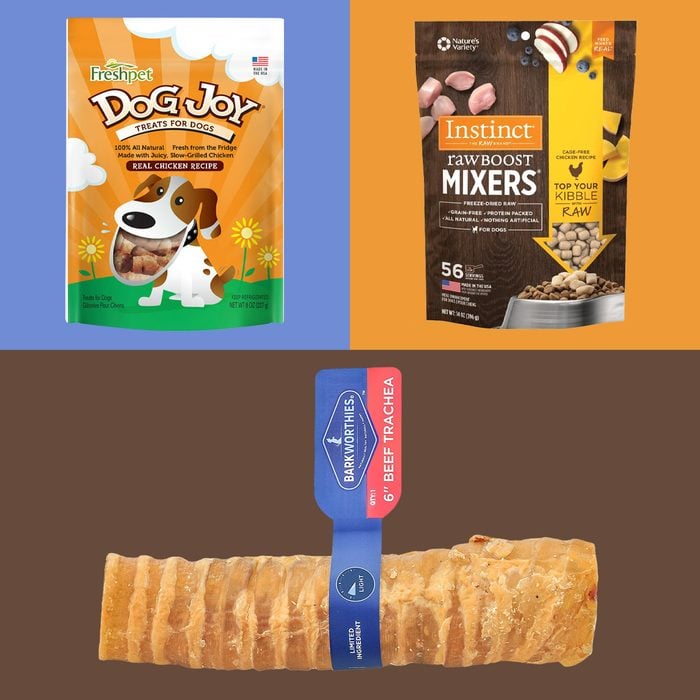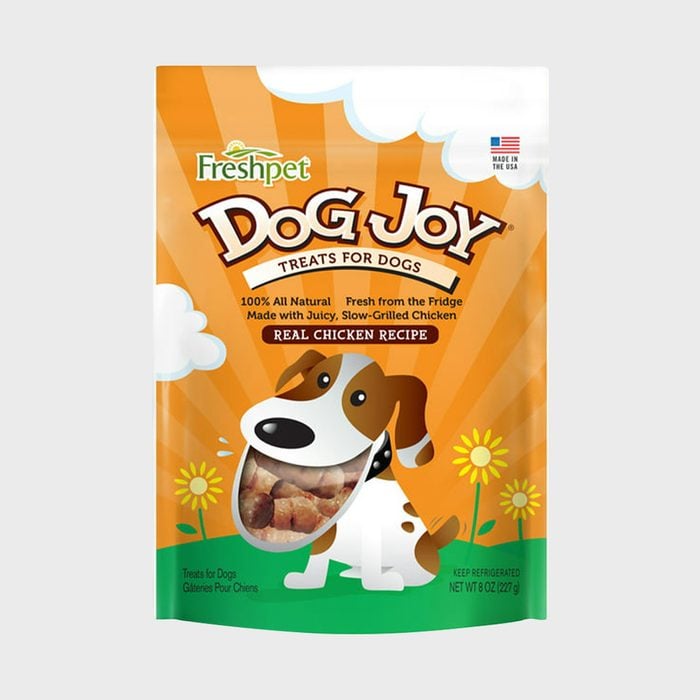 via merchant
via merchant
Best overall healthy dog treat
Freshpet Dog Joy
Freshpet Dog Joy is a fresh dog treat for adult dogs that uses fresh whole meat and vegetable ingredients without the preservatives. Store the treats in the refrigerator, but don’t worry about stinking up your fridge thanks to the resealable bag. They have a fresh aroma and come in different forms and flavors, each with peas, carrots and other fresh ingredients. Divide the treats—shaped a bit like Vienna sausages or bacon strips—into several bite-size pieces for small dogs, or serve them whole for bigger pups.
Freshpet gets rave reviews from many of the pet experts I spoke to, including certified dog behavior consultant Greta Kaplan of Fuzzy Logic Dog Training, and veterinarian Dr. Lore Haug of Texas Veterinary Behavior Services. I used the Freshpet Dog Joy treats to train my German Shepherd, Magic. He’d nearly do backflips for this healthy dog treat—and yours would, too. (Here are some dog tricks you can teach your pup for extra treat opportunities.)
Pros
- Fresh treat without prep or cooking
- Contains no preservatives (which is why you’ll find it in the refrigerator section of the store)
- High palatability—even picky dogs seem to love them
- Small treat servings make it suitable for dogs of all sizes and ages
Cons
- Must be refrigerated and used within 14 days
- Not all stores ship fresh or frozen products (check for availability)
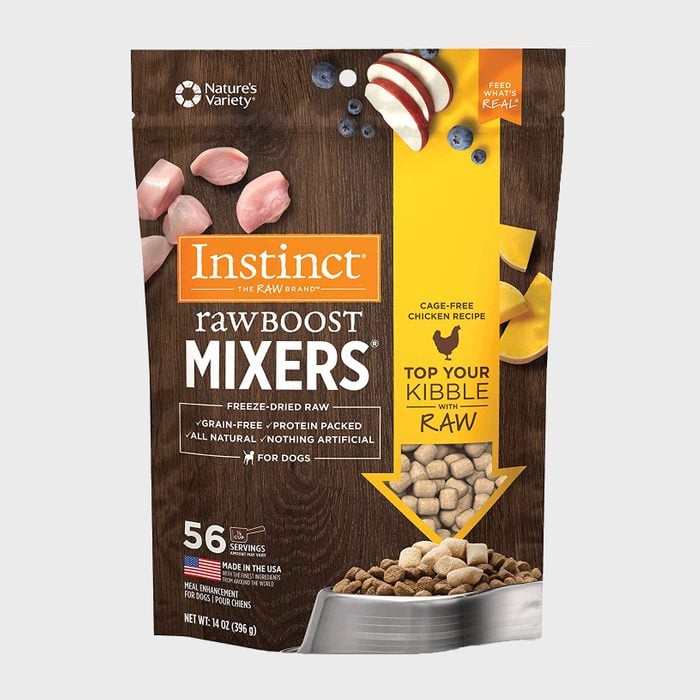 via merchant
via merchant
Best value healthy dog treat
Instinct Raw Boost Freeze-Dried Food Topper
Similar to these recommended dog foods, many dog professionals suggest fresh or even raw ingredients for treats. I like Instinct Raw Boost Freeze-Dried Food Topper as a safe commercial option with raw, whole ingredients.
Promoted as a dog food topper to supplement your pup’s regular food, the freeze-dried morsels contain raw meat, fruit and vegetables. They’re the perfect size for healthy dog training treats. The recommended serving size is one-eighth of a cup, which lasts for 56 training sessions. We used these as treats for Bravo-Dawg, a 120-pound Bullmastiff, and he relished each tiny morsel—and the attention that came with it.
Pros
- Affordable: A 14-ounce package holds 56 servings at about 50 cents each
- Freeze-drying naturally preserves the food and makes morsels easier to handle
- No refrigeration needed
- Comes in three flavors: beef, lamb and chicken
- Mess-free and easy to take on the go
- Over 3,000 Amazon ratings averaging 4.7 out of 5 stars
Cons
- Less filling than other treats
- Not as aromatic, so may not appeal to every dog
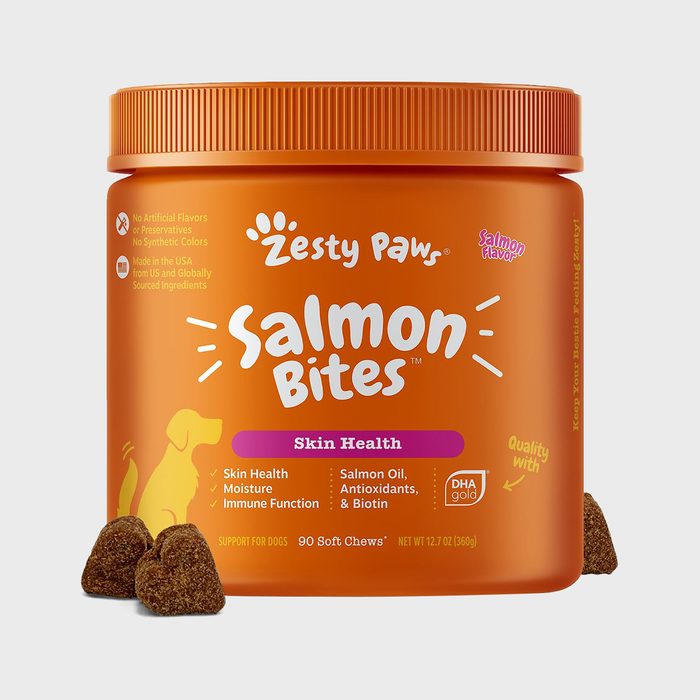 via merchant
via merchant
Best healthy fish dog treat
Zesty Paws Salmon Bites
Judging by kitty behavior, people often think fish appeals more to felines, but dogs like it just as well. These Zesty Paws Salmon Bites provide a fishy flavor and crunch with no added ingredients. Animal nutritionist and educator Cat Lane of The Possible Canine usually makes her own healthy dog treats, but also recommends store bought treats.
Made with human-grade ingredients in a kitchen, products like Zesty Paws are known for wholesome nutrition for companion animals. These salmon bites are made of Alaskan salmon oil, Omega-3 fatty acids, biotin and DHAgold. They’re are a good choice for pets with food sensitivities to other ingredients like chicken or beef. Curious to learn more? Check out our full review of these trending salmon bites.
Pros
- Contains Alaskan salmon oil and Omega-3 fatty acids
- Improves dog’s skin and coat and can reduce itchiness and chronic licking
- Easily digestible
Cons
- Fish oil can be too rich for some dogs, causing diarrhea
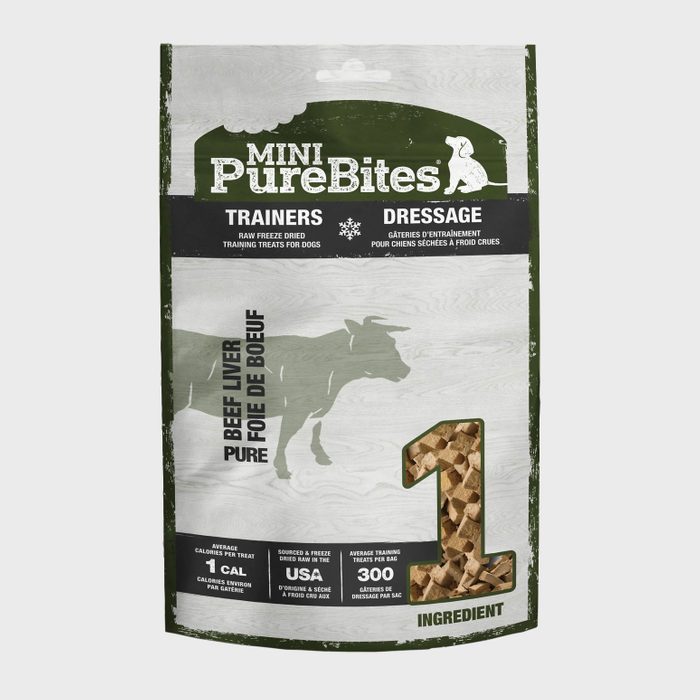 via merchant
via merchant
Best healthy treat for small dogs
PureBites Mini Trainers
Many little dogs weigh far less than my thirty-pound Shadow-Pup. Despite tiny jaws, they have guard dog attitudes and deserve yummy treats that are safe. However, they can’t manage the large size of big-dog treats (and might even choke!), and large morsels also give too many calories for their diets.
That’s where PureBites Mini Trainers come in. Instead of having to cut down bigger morsels for your toy poodle, Yorkshire terrier or new puppy, PureBites Mini Trainers are specifically sized for small dog breeds. The raw, single-source ingredient cubes are freeze-dried and come in several flavors.
Pros
- Good value at 300 treats per 3-ounce bag
- About 1 calorie/treat
- Flavor choices include raw beef liver, raw chicken breast and raw lamb liver
- Made in the U.S.A. with American-sourced ingredients
Cons
- Expect some waste from crumbles at bottom of the bag
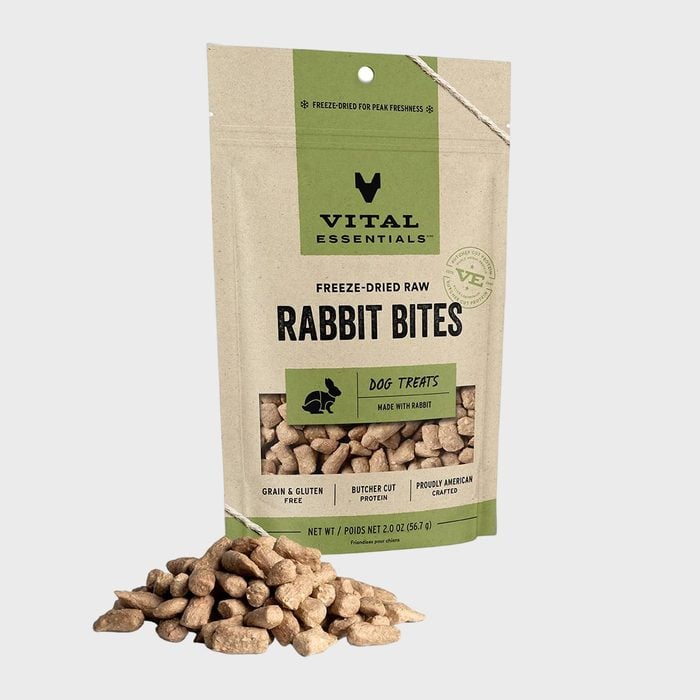 via merchant
via merchant
Best healthy dog training treat
Vital Essentials Freeze-Dried Rabbit Bites Dog Treats
These healthy, single-sourced rabbit treats offer another unique protein source in treat-size morsels. Alix Mitchell, a professional dog trainer, veterinary technician and podcaster at Fetch For Me, Human, recommends Vital Essentials dog treats.
The Freeze-Dried Rabbit Bites Dog Treats include no added fruits or veggies, just the rabbit meat, organs and ground bone, all sourced in the U.S. The kibble-shaped treats are about thumb-size or smaller. Vital Essentials also offers different meaty treats, from beef to fish, to satisfy the pickiest canine. Here are probiotic dog foods for an extra health boost.
Pros
- Treats come in rabbit, beef, duck, lamb or fish flavors with vital organs and ground bone
- Raw ingredients are freeze-dried to preserve nutrition
- Made in the U.S.A.
- Nearly 9,000 Amazon ratings, averaging 4.7 out of 5 stars
Cons
- Some reviews complain of a pungent aroma—but dogs tend to like this
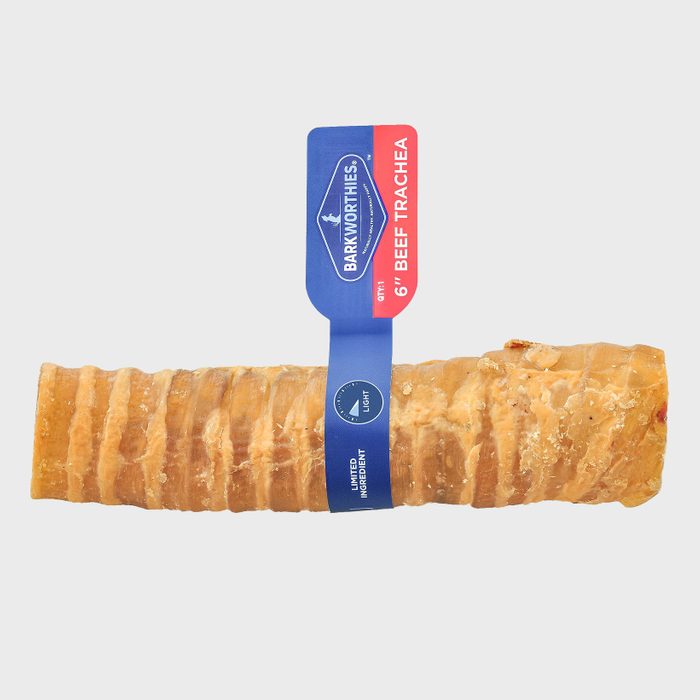 via merchant
via merchant
Best healthy crunchy dog treat
Barkworthies Beef Trachea
My Shadow-Pup demands one of these Barkworthies Beef Trachea treats every day. The beef trachea, dehydrated for easy handling and natural preservation, offers a satisfying chew. It ranges between six and eight inches long, varies in width and looks a bit like the cardboard inside a roll of paper towels.
Dogs adore chewing (hence the need for indestructible dog toys), but chewing bones may prove hazardous and break teeth, or can be unsanitary if raw. This offers a tooth-safe compromise that lasts longer than single treats. It’s best for moderate chewers—please supervise!—as large dogs may chew off larger pieces and risk choking. We usually cut the trachea into two or three pieces to last longer, and Shadow chews one up within about twenty minutes.
Pros
- Natural treat
- Sourced from grass-fed, free-range cows
- 100% digestible
- Natural source of glucosamine and chondroitin with joint health benefits
- Supports dental health
Cons
- Strong aroma
- Oily and may stain carpets or upholstery
- Must supervise to avoid choking hazards
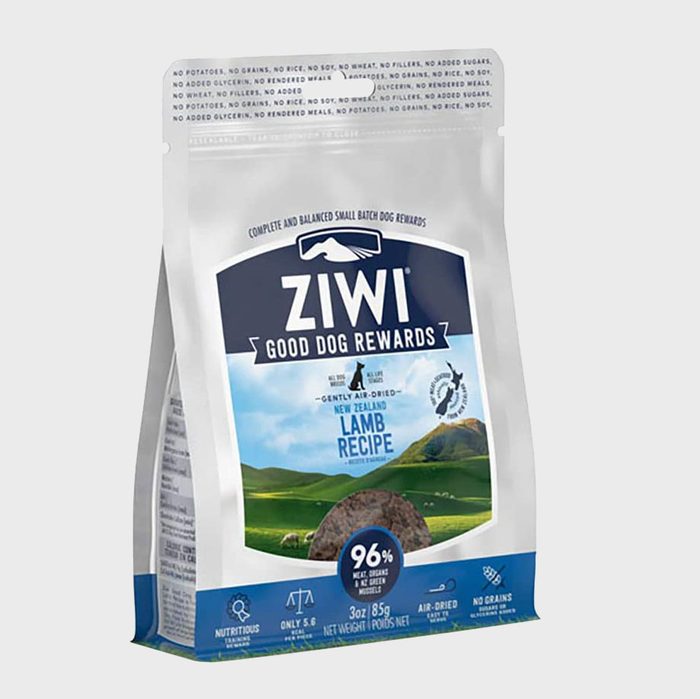 via merchant
via merchant
Best dog treat for mobility
ZIWI Peak Good Dog Rewards Training Treats
ZIWI Peak products is another treat that comes highly recommended by my professional trainer friends. Manufactured in the U.S.A., many of the ingredients come from New Zealand, which is known for high-quality lamb meat sources. The ingredients are 96% free-range lamb, New Zealand green mussels and organic kelp (a seaweed superfood). Plus, the tripe included in the treats provides natural anti-inflammatory properties that can help with creaky joints. Make sure to try out these organic dog treats for your pooch as well.
Pros
- Includes canine “superfoods” to improve mobility
- Good for dogs of all ages
- No added carbs, grains, fillers or sugar
- Over 1,400 Amazon ratings, averaging 4.5 out of 5 stars
Cons
- More expensive than other treats on this list
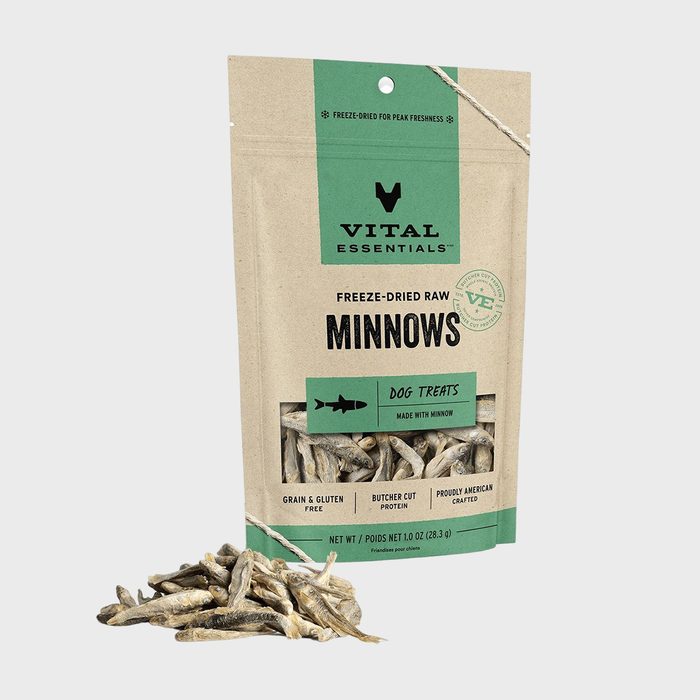 via merchant
via merchant
Best healthy dog treat for weight control
Vital Essentials Freeze-Dried Minnows
Dogs with a bit too much pudge can still have treats, which is good because those puppy dog eyes are hard to resist! Some dogs suffer from pancreatitis, too, aggravated by too much fat in the diet. With the Vital Essentials Freeze-Dried Minnows, you can treat without worry. The minnows look like sardines, and eating them whole allows the dog to reap all their health benefits. They are also well beneath the standard fat content of many other treats, at 13%. Cats like them too, but your dog probably won’t want to share.
Pros
- The freeze-dried fish offers crunch, flavor and dog-appealing smell
- Hormone-free and antibiotic-free
- Limited ingredients for dogs with sensitive stomachs or nutrition needs
- No need to refrigerate
Cons
- Smelly for humans—store in sealed container
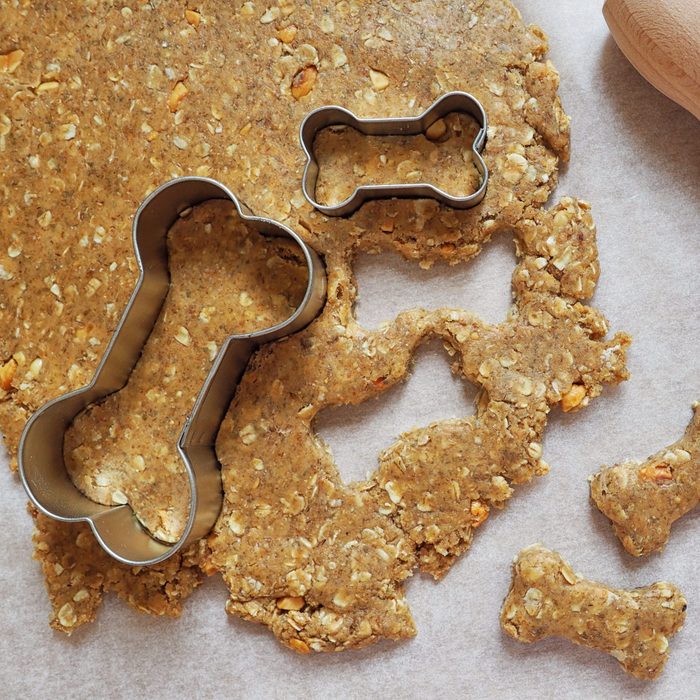
Homemade dog treats
Many pet experts have their own homemade dog treat recipes using whole, fresh ingredients. Recommendations include fresh veggies like carrots, sweet potato, zucchini and cucumber. Pet-safe fruits such as blueberries (my Shadow-Pup loves fresh orange and apple slices) are also a good option. Single-source ingredients like fish, chicken, venison or rabbit are recommended proteins, as well as organ meats like liver, lung and heart.
Dog trainers often dehydrate fresh foods for convenient-to-carry options, turning green beans into crunchy treats, for example. Single-ingredient meat or fruit baby food offers lick-worthy healthy dog treats you can freeze in tiny amounts for “pup-sicle” fun. Healthy people-food snacks can bring on lip-licking satisfaction for dogs, too. Check out these other DIY pet products you can make at home.
Pros
- Natural—no processing
- You control the ingredients
- Dogs love snacking on what humans eat
Cons
- You’ll need to know what foods dogs can (and can’t) eat— for example, did you know grapes are toxic to dogs?
- Proteins will need to be cooked or dehydrated for safety
What to look for when buying healthy dog treats
Dog experts recommend avoiding dog treats with high levels of fat (over 25%) or chemical preservatives. Labels must provide a guaranteed analysis of ingredients of a percentage by weight, with ingredients listed with the greatest amount at the top of the list. You might need a converter to understand the true percentage of fat. Experts prefer U.S.-produced treats since they usually have more safety oversight than those made overseas.
Look for single-source ingredients. Freeze-dried or dehydrated protein products, for example, have high dog approval with a lot of nutrition packed into tiny amounts. Dehydrated fruits and veggies also last a long time without a lot of preservatives. Some of these treats also satisfy the dog’s urge to chew. Many experts and pet parents prefer human-grade ingredients, or products produced under the same conditions as for human consumption. Be on the lookout for these ingredients you never want in your pet’s food, too.
Veterinarians caution what’s best for your new puppy won’t be ideal for a senior canine. Even doggy athletes have special needs. Your dog’s ideal treat depends on his unique needs—and individual preferences. Ask your vet for some recommendations, especially if your pup has health challenges that impact what she should eat. And remember that even the best healthy dog treat is worthless if Fido won’t eat it.
How we found the best healthy dog treats
As shopping experts, our only job is to help you find a winning product. We start with the research and reporting basics—what products are made of, what they look like and how much they cost—to ensure that we’re only recommending the buys that are worth your time and money. Then, we research the features that speak to the product’s quality, taking advice from industry insiders and subject matter experts on what makes a product a smart value (or worthy of a splurge). Finally, we do the work of combing through user reviews to see how real people interact with the product, and if it stands up to the test.
There are thousands of healthy dog treats available to suit every dog. I chose my top healthy dog treats based on a combination of several things:
- Formulation and purpose
- Appeal for the dog
- Rankings and ratings
- Reviewers’ comments
- Experts’ recommendations
FAQ
What is the healthiest treat for dogs?
The healthiest dog treats are those with whole, natural ingredients as opposed to synthetic and artificial ingredients. Organic treats are a good option. Just talk with your dog’s veterinarian to see which treat is best for your furry friend.
What dog treats should I avoid?
Avoid treats with unnatural coloring or dyes, high fat, dairy, sugar or other artificial sweeteners. Rawhide bones are also a no-no for dogs, as well as some human snacks like grapes, nuts, chocolate or avocados.
About the Experts:
- Greta Kaplan is a certified dog behavior consultant at Fuzzy Logic Dog Training.
- Dr. Lore Haug is a veterinarian at Texas Veterinary Behavior Services.
- Cat Lane is an animal nutritionist and educator of The Possible Canine.
- Pat Miller is a certified dog trainer, behavior consultant and owner of Peaceable Paws LLC.
- Eva Gellert is general manager of WagnSwim, a swim and fitness center for pets.
- Alix Mitchell is a professional dog trainer, veterinary technician and podcaster at Fetch For Me, Human.
- Jenny Yasi is a dog trainer and owner of Whole Dog Camp.
- Brae Raphael is head dog trainer at Dog River Pet Supplies.
Craving more paw-some content? Get hilarious videos, heartwarming stories and editor-vetted product recommendations for every type of pet delivered right to your inbox. Sign up for The Scoop.

